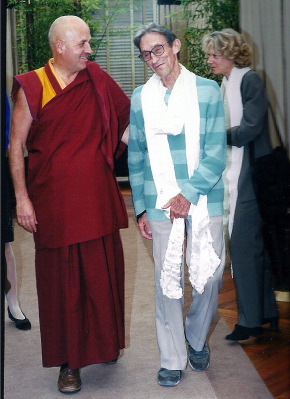Father Ceyrac is now 97 years old and still lives in India close to those to whom he gave so much help and so much love. With limited means, this French Jesuit Father, who has lieve in the Indian Tamil Nadu region for nearly half a century, has succeeded in rescuing from a state of utter neglect 45,000 poverty-stricken children, whom his network feed and support their education. A few years ago I had the opportunity to meet with him several times and, in particular, speak with him during an interview conducted by the French journalist Claudine Vernier-Palliez. Here are a few extracts of our conversation.
M.R.: The Dalai Lama often says that religion is a choice but that kindheartedness, love and compassion are a necessity for all sentient beings.
P.C.: In love, if there is no respect, we do not truly love. If there is no tenderness, we do not truly love. In India, I never address a poor person in a colloquial manner. Colonists, the rich, and high caste members are the ones who speak down to them. Poverty and destitution are two different things. Destitution (just like wealth) can dehumanize. Never poverty. Jesus Christ, the apostles, the Virgin Mary were poor. Our mission is to help our Indian friends to be more, and not so much to have more. ‟The great development,” said Gandhi, ‟is to be more.”
M.R.: Tenderness and empathy correspond to this openness that we have at our very core with respect to another’s suffering and prevents us from become hardened within. The protective shell that separates us from another is removed through compassion.
P.C.: I am always struck by the lack of kindheartedness found in the Parisian streets and subway. People avoid contact, they do not smile at each other.
M.R.: If you display a gesture of friendliness, often people find it odd. A smile can sometimes be seen as a threat. However, in India, if you do not speak to someone who has been standing next to you within thirty seconds, it is because you are either deaf or mute.
P.C.: In the trains in India, we share everything we have. We are all together; we speak from car to car. We partake of the conversation of the traveler who is in the upper bench; we offer our bananas to our neighbor below. In night trains, after five minutes, everyone is in pajamas, and they all talk together as if they were kin.
M.R.: In France, after an hour, we hardly dare look at the person next to us in the train or an airplane. And if by chance that person looks at you, he or she does not really see you. It’s as if you were transparent.
P.C.: In spite of everything, and even in France, I am struck by the immense kindness of people, even coming from those who seem to keep their heart and eyes closed. It is others, all others, who weave the fabric of our lives and shape the substance of our existence. Each one is a ‟note in the grand symphony of the universe” as the poet Tagore once said. And no one can resist the call of love. After a while, we all succumb to it. I really believe that man is intrinsically good. We must always see the good, the beautiful in another person, never destroy, but always seek the best of man ‟standing tall with his head held high,” without religious, caste, or philosophical distinction.
 Photo Olivier Follmi
Photo Olivier Follmi